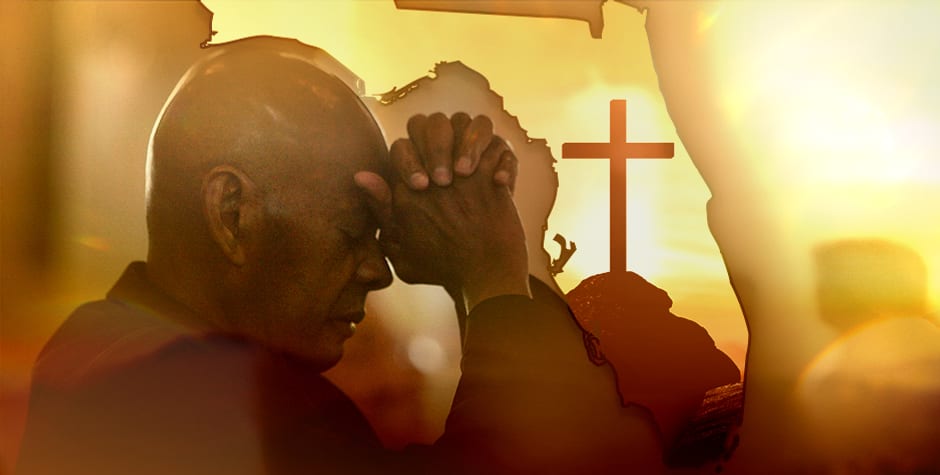ACLJ Files in Key Federal Court Case To Defend Constitutionality of Public Prayer in Defense of the City of Ocala, Florida
Today the ACLJ filed a crucial motion in federal court in Florida to protect our longstanding history and tradition of calling for prayer in time of trial. This legal battle to protect prayer has been a long one and began in 2014 after a shooting spree caused tragedy in a small Floridian community.
Today’s motion for summary judgment asks the court to rule in our favor based on a clear reading of the law and the Constitution, as the essential facts are not in dispute. In September 2014, the Ocala Police Department (OPD) investigated a shooting spree that left several children injured. Though the police knew who the shooters were, they were unsuccessful at convincing any witnesses to come forward. Community leaders decided to hold a prayer vigil to bring the community together and encourage cooperation between the community of Ocala and the police department. People of all faiths – and even people of no faith – were encouraged to help lead and plan the event. Volunteer chaplains and private citizens spoke at the event.
While no city officials participated in the vigil or led prayers, a group of atheists challenged the vigil, taking issue with the OPD’s vocal support for the prayer and OPD volunteer chaplains’ participation in the vigil. Shortly after the vigil, the atheist citizens filed a lawsuit claiming that the public prayer vigil violated the Establishment Clause of the Constitution.
This case has a lengthy history and has taken many twists and turns. However, from the very beginning, we argued that the notorious “Lemon” test employed by lower courts for years in evaluating Establishment Clause cases was inadequate and failed to capture the intent of the First Amendment. Though a public entity cannot establish a religion, the Supreme Court has affirmed that a government entity does not have to “purge from the public sphere anything an objective observer could reasonably infer endorses or partakes of the religious.”Kennedy v. Bremerton Sch. Dist., 142 S. Ct. 2407 (2022). If this were the case, the National Day of Prayer would cease to exist. Accordingly, “the Establishment Clause must be interpreted by ‘reference to historical practices and understandings’” at the time of the founding. Id. at 2428 (quoting Town of Greece v. Galloway, 572 U.S. 565, 576 (2013)).
After hearing our appeal, the Eleventh Circuit agreed and sent the case back down to the district court to apply a different test. As we explain in our motion filed today asking the court to grant summary judgment in favor of the City of Ocala, the Establishment Clause does not, nor was it ever intended to, prohibit proclamations of prayer or the offering of supplications to the Divine. Indeed, on “[t]he day after the First Amendment was proposed, Congress urged President Washington to proclaim ‘a day of public thanksgiving and prayer, to be observed by acknowledging with grateful hearts, the many and signal favours of Almighty God.’” Lynch v. Donnelly, 465 U.S. 668, 675 n. 2 (1984) (citation omitted). In response, Washington proclaimed November 26, 1789, a day of thanksgiving to “‘offer[] our prayers and supplications to the Great Lord and Ruler of Nations, and beseech Him to pardon our national and other transgressions . . . .’” Id. (citation omitted). Such “forthrightly religious” Thanksgiving proclamations have been “issued by nearly every President since Washington.” Town of Greece, 572 U.S. at 580 (citation omitted).
Attempts are frequently made to rewrite American history and erase the religious foundation on which it was based. The entire system of American government was founded on Judeo-Christian values. While the Establishment Clause was put in place so that people of all faiths could exercise their beliefs without the government forcing a religion upon them, it was never meant to prevent the government from offering citizens of all faiths an opportunity to come together as a community and pray.
The ACLJ continues to fight for the religious rights of Americans and their ability to exercise those rights how they see fit. It is important to be vigilant and fight for the freedom to express our religious beliefs without fear of punishment or retribution by those who seek to eradicate religion from the public square. In the coming weeks, we will respond to motions filed by the atheists and file replies to their responses as this case moves forward. We are confident that the Constitution stands on the side of public prayer and will keep fighting to defend your right to pray.
